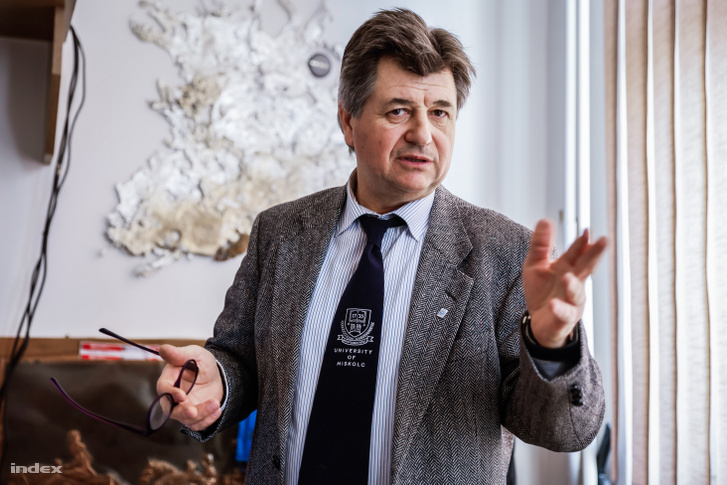According to Dr. Tamás Kékesi, it is especially comical that parties and organizations concerned about environmental effects, without knowing the professional and technological facts, try to torpedo the battery recycling efforts that are just emerging (most recently the Andrada company visited several locations in this way), while precisely this kind of technology it can be guaranteed that the production will not have a negative environmental impact.
According to Dr. Tamás Kékesi, a professor at the Faculty of Materials and Chemical Engineering of the University of Miskolc who has been dealing with special metal extraction and metal purification for decades, we need a lot of battery recycling plants, all the more so, as this way we can ensure that battery production is environmentally friendly.
In Western Europe, countries sometimes go out of their way to build the next modern battery factory, and the population also welcomes investments, mostly from the East. Not so in Hungary, where every public hearing turns into a real battlefield.
It is enough to remember the public hearing of the CATL battery factory planned for Debrecen at the beginning of last year, where the company's Chinese representatives were supposed to be heard, but the dispute turned into a fight. The biggest problem is that the case of the battery factories has become a political issue, and the independent experts and university representatives are not questioned by the organizers of the hearings, nor by the representatives of the population, so the real professional arguments do not even appear, but the demagogy is all the more
- said the professor of the University of Miskolc, who is also the former director of the Institute of Metallurgy and Casting.
He finds it particularly comical that, for example, parties and organizations concerned about environmental effects, without knowing the professional and technological facts, try to torpedo the battery recycling efforts that are just emerging (most recently the Andrada company visited several locations in this way), while with such technology it can be guaranteed that there will be no negative environmental impact of production, emphasizes the professor.
Why did a toxic substance get into the water of the Göd wells?
According to the expert, it cannot be said that Andrada's procedure is the best technology, the "best available technology", even though what he wants to implement for the time being is only the physical preparatory phase. The result is "black mass", which concentrates the valuable cathode material in the form of a black powder. We learned from Professor Kékes that this is a highly sought-after semi-product that can be transformed into final products through hydrometallurgical processing. The latter phase is still developing worldwide, and China is a leading technological power in this regard. A new hydrometallurgical plant was also built in South Korea using Chinese technology.
According to the professor, production waste should be sent directly to recycling plants specialized in its treatment. Because in the case of Göd, it could also have happened that they could not properly store the increased mass of dangerous substances during production, so the constituents of an organic solvent could have entered the soil. This could not happen if waste processing companies were allowed to form and develop.
However, there are those who whip up the public mood, but do not refer to facts. Maybe that is why the construction of plants recycling intermediate production and depreciation waste is delayed?
asked the professor. "With this, people, the environment and all participants lose," emphasized Kékesi.
"Such technologies operate precisely in advanced industrial societies with excellent security and under strict supervision. This is also necessary in Hungary, not only because of disposal, but also because of the utilization of very valuable components and sustainable production."
he added.
Batteries hide treasures
Reading the press reports, it may not occur to anyone that lithium-ion batteries are green. And yet this is precisely the reality, because the very expensive ingredients contained in it can be recycled endlessly - Tamás Kékesi told our paper.
The main value is given by the "non-ferrous metals" in the battery, i.e. non-ferrous metals ("transition metals" based on their chemical characteristics). We have already discussed the semi-product, black mass, which can be obtained through physical separation and enrichment.
A ton of this can cost thousands of dollars.
In addition to anode graphite, it contains expensive complex metal oxides, ground into a fine powder. This is delivered in lined "big bags" to the hydrometallurgical metal extraction plants, where very pure non-ferrous metal salts are finally produced using acid technology (dissolution, filtration, solution purification, ion separations, crystallization, solution recycling, etc.). In a further step, the also valuable and rare lithium metal is extracted as lithium carbonate. Such is hydrometallurgy, which is a completely closed cycle process - it works in many places around the world for the processing of ground materials of primary ores and such dusty or muddy waste materials. Although it looks complicated, it is based on completely standard procedures, which does not mean that it is dangerous. Rather, during the production of black mass, the proper separation and treatment of the organic electrolyte can be a source of danger. There are several approaches to this, every processing plant is afraid to protect - or patent - its solution for the treatment of organic constituents.
The professor has already visited several such plants, and he did not find any deficiencies.
Images of such plants can also be found on the Internet. At home, it can even look like a city park, what can be seen around it. According to the professor, it is worth getting to know such plants more closely - and also during operation - as personal experiences are the most convincing. Therefore, he even visited Korea as a member of a Hungarian expert group. He said that it is worthwhile not only to study the technology, but also to obtain black mass samples for the tests still being carried out in the laboratories of the University of Miskolc.
The Hungarian government can play South Korea's cards
The professor pointed out that a lot of lithium-ion batteries are produced in South Korea, so there is also a lot of waste. For the time being, they still import the raw material needed for production, but this may soon change as they acquire more and more infinitely recyclable raw materials.
The Hungarian government can also follow this logic, seeing the economic opportunity inherent in recycling, which also gives a push towards the green transition. The Slovenian Andrada group, which was founded to take advantage of the opportunities, would also build such a recycling plant in Hungary, but there are other applicants from the East and the West with even more good references and their own experience. However, the latter are only "groping".
For now, the plans are "only" about disposal and the production of the enriched black mass semi-product by physical, mechanical methods.
In the longer term, it may be worthwhile to implement hydrometallurgical technology that ensures the extraction of valuable metals (in the form of inorganic compounds or even in the metallic state) in connection with such preparatory plants, according to the professor. It is by no means a good idea to transport more and more – originally dangerous – waste materials abroad. This is difficult to achieve, and the extracted values should also be given up in this way. Of course, the black mass obtained after physical preparatory operations can be sold as well as "hot buns", and this market is currently developing.
The professor said that his research team checked the technological options and offers for the processing of lithium-ion battery waste, including the adequacy of the Andrada group's procedure.
A long and profound set of questions was put together, to which Andrada also gave answers covering the details of the technology, and there was even an opportunity for a personal consultation. At this level, their idea, which did not cause surprises, seemed good and supportable
Kékesi indicated.
The same was done by more distant, western or eastern companies that already have experimental or production plants elsewhere, although not in all cases they gave in-depth answers. However, it was possible to develop a better picture by looking into the operation of the existing reference plants. The main elements of the known technologies are otherwise almost identical, rather there are differences only in the separation of individual pollutants and the guaranteed purity of the product.
The professor also demonstrates that black mass can also be produced with hand tools in the laboratory, for which reliable and efficient large-scale industrial methods have already been developed.
Green battery factory and endless recycling?
According to the expert, South Korean technologies are one of the most effective and safest on the market, because the goal is full utilization there, as well as increasingly strict environmental regulations, similar to those in the European Union. In the past, we have written several articles about the fact that EU regulations sometimes turn out to be excessively strict.
Environmental protection is very important and these are technologies that absolutely help it, not threaten it
- claims the professor, who believes that the greater danger is if we don't use the technology, "after all, then what will happen to the waste?", he asks.
The EU has already voted in favor of electromobility. This will stay with us as a longer-term goal and evolve.
The vehicle industry is of particular importance in our country, and manufacturers have also started switching to electric models in Hungarian plants. Audi in Győr and Mercedes in Kecskemét have also started producing electric cars, and the latest electric models will also be produced in the new BMW plant in Debrecen. Hybrid vehicles are already being produced at the Suzuki factory in Esztergom. For this reason, domestic car factories are increasingly in need of battery industry suppliers, and the demand for batteries is increasing throughout Europe.
There are those who fear that the waste will be piled up in mountains
According to the professor, the most dangerous thing would be if we didn't use recycling technology, because then the waste would really end up in mountains, or it would have to be transported over long distances under strict conditions. This is not even compatible with the Basel Convention, which may even prohibit the export of hazardous waste in the absence of appropriate international agreements. In Hungary, battery production is already taking place at four locations, so it will practically be mandatory to ensure proper waste management.
In 2022, 73 percent of the foreign capital investments coming to our country came from the battery industry and vehicle production. In Hungary, lithium-ion batteries are manufactured at the following locations:
• In Komárom, the South Korean company SK ON,
• The Korean Samsung SDI factory in Gödön,
• In Miskolc, the Japanese GS Yuasa,
• SK ON's other plant in Iváncsa is ready to start,
• The CATL factory is being built in Debrecen, but the construction of the other factory, EVE Power, has also started.
And the government has clearly communicated that it is not putting the brakes on the electric car market, and is even stepping on the gas. CATL has embarked on a HUF 3,000 billion (EUR 7.34 billion) investment in Debrecen, within the framework of which the company will build its second European plant – after the battery factory in Germany.
Professor: Waste processing plants are of critical importance
In September of last year, Minister of National Economy Márton Nagy highlighted that battery production is an integral part of the Hungarian economy, and in the coming years more than 6,300 billion forints worth of development could come to the sector, which could create 20,000 new jobs.
Hungary can be the world's 4th largest battery industry power after China, the United States and Germany, our country's production capacity can reach 250 GWh, thus we will be able to serve 35 percent of European needs
underlined the minister.
The professor also believes that Hungary should not miss out on these opportunities, and that the frequently heard battery-producing "superpower" indicates a vision of development.
Of course, this should only be understood in a relative sense, since the absolute number cannot even be compared with China's production capacity. Projecting the developments to 2027, in the absolute distribution of lithium-ion battery production capacities by country – after China, the USA and Germany – Hungary may indeed rank 4th, but this represents only 2 percent of the total production. The current ratio of almost 4 percent may therefore decrease, which mainly means a stronger development of the American and German production capacities:
Thus, it cannot be said that the size of the Hungarian battery industry is disproportionate compared to Germany
explained the professor. Márton Nagy previously emphasized that battery factories can significantly increase research and development expenditures. For example, CATL has already entered into a research collaboration with the department of Eötvös Loránd Kutatási Hálózat specialized in battery research, and in addition, the Chinese company's own research institute opens the possibility of further research collaborations for Hungarian researchers. He also stipulated that the government's goal for all investments is to ensure that they comply with regulations and environmental protection conditions, and that as many Hungarian companies as possible and at the highest level can be involved in production as suppliers, thereby improving the competitiveness of the Hungarian economy.
Prime Minister Viktor Orbán also surprisingly talked a lot about the green transition of the automotive industry in his annual review. Regarding the ongoing struggle for investments, the Prime Minister explained that it is similar to open water swimming competitions:
We have to fight and push, but we are not bad at this, we want to imitate the world champion Kristóf Rasovszky, because for the first time since time immemorial we are not followers of a technological, revolutionary transformation, but global leaders, which also saves the car factories
said Viktor Orbán.
At the same time, Professor Kékesi indicated to our paper that the waste generated during battery production can become a critical problem, which must be dealt with immediately, as both electric cars and batteries will remain. The best we can do is to try to have the smallest environmental impact and recycle waste. Battery recycling is therefore both a huge business and an environmental imperative.
Index
Featured image: Kata Németh / Index












